The Genius and the Goddess (29 page)
Read The Genius and the Goddess Online
Authors: Jeffrey Meyers

Mailer revealed how he planned to seduce Marilyn, replace Miller
and write a work especially for her: "I lived five miles away from him
in Connecticut, so I kept waiting for the moment for Miller to pick
up the phone and say: why don't you come over to dinner? The call
never came. . . . I just would have tried to make her fall in love with
me. . . . I would have thought of writing a play in which she would
star."
18
Rosten explained that Mailer's devious stratagem was foiled
when Miller, suspecting the base motives of his would-be rival, froze
him out: "Miller didn't want to set anything up with Mailer. He just
didn't like the idea. Miller is a rabbi, and he didn't want this strange
guy powering in. He wasn't a buddy of Mailer's, and they'd always
had a vague sort of animosity toward each other ever since the late
forties in Brooklyn Heights. . . . Miller didn't want to risk his bride
being contaminated by Mailer or – while I didn't say it then – maybe
getting fucked by Mailer."
In his idiosyncratic book on Marilyn, Mailer suggested that Miller
– whom he loathed and mocked – did not satisfy her. He also conceded
that he himself did not have the patience and tolerance to support
and protect her, and that he and Marilyn would have torn each other
apart. (He'd once stabbed one of his wives; Marilyn might have stabbed
him
.) Describing himself, Mailer wrote: "One of the frustrations of
his life was that he had never met her. . . . The secret ambition, after
all, had been to steal Marilyn; in all his vanity he thought no one
was so well suited to bring out the best in her as in himself. . . . It
was only a few marriages (which is to say a few failures) later that
he could recognize that he would have done no better than Miller
and probably been damaged further in the process."
19
Throughout her adult life Marilyn was plagued by serious physical
illness and often incapacitated by pain. She was hospitalized twenty-four
times and (apart from her early abortions) had at least twelve
operations (see Appendix). Despite the physical hardships, illness had
a certain appeal for Marilyn, who seemed to enjoy hiding out in
hospitals and having a kind of medical holiday. Once there, the star
patient had a kind of careless freedom, a comfortable routine with
no responsibilities, and received from the doctors and nurses all the
protection, care and lavish attention she never had in childhood.
Nevertheless, when still pale and weak, she was mobbed by fans and
forced to smile at the crowd as she left the hospital.
Marilyn's difficulties with Miller and with her colleagues, as well
as her addiction to drugs, can best be understood in their medical
context. The fear and insecurity when she was awake caused insomnia
at night. At two or three in the morning, when she had a lot to drink
but couldn't sleep, she'd get on the phone and wake up friends who
were
asleep. She started to take sleeping pills in the early 1950s. Her
main suppliers were two men she thought were her friends: the journalist
Sidney Skolsky, who had an office in Schwab's drugstore and
could get whatever drugs he wanted without prescriptions, and Milton
Greene, who later succumbed to catastrophic addictions. During the
day Benzedrine and Dexedrine suppressed her appetite, kept her awake
and induced a mild euphoria. At night, barbiturates – sedatives and
hypnotics like Seconal and Nembutal – eventually put her to sleep.
As her tolerance increased, she took as many as twenty pills a day,
and would pierce the capsules with a pin to speed up the effect. Susan
Strasberg, a sympathetic friend, gave a horrific account of Marilyn
dragging herself on all fours through the family's apartment after she'd
overdosed, And whimpering for help: "She had taken too many sleeping
pills one night after drinking champagne, and awakening groggy and
dazed, needing help and unable to stand up, she had crawled on her
hands and knees to my parents' doorway, scratching at it with her
fingernails. . . . I hid so she wouldn't have to know that I had seen
her that way, helpless and vulnerable."
Marilyn had sloppy habits (which disturbed both DiMaggio and
Miller), especially when there were servants to pick up after her. The
sharp-eyed Billy Wilder described the chaotic back seat of her prized
Cadillac convertible: "There [are] blouses lying there and slacks, dresses,
girdles, old shoes, old plane tickets, old lovers for all I know, you never
saw such a filthy mess in your life. On top of the mess is a whole
bunch of traffic tickets." But dirtiness, especially in a woman who
spends most of the day beautifying herself, was a sure sign of mental
illness. When depressed she even went out in public with menstrual
stains on the back of her dress.
Marilyn's most persistent medical problems were gynecological, most
probably the result of her dozen illegal abortions. These back-alley
procedures may have caused infections and adhesions that either
prevented pregnancy or led to
miscarriages. She also had endometriosis,
a condition found in 10 to 15 percent of women from their mid-twenties
to mid-forties, in which the tissue lining the uterus grows
unnaturally outside the womb, scarring and distorting the ovaries and
Fallopian tubes. It causes painful coitus, agonizing periods, severe
bleeding, and infertility from either spontaneous abortion or ectopic
pregnancies (when conception occurs in the Fallopian tube instead of
in the uterus). Marilyn had operations for endometriosis in November
1954, May 1961 and July 1962, but the surgeons in Cedars of Lebanon
Hospital in Los Angeles were unable to correct the problem.
In the summer of 1956, soon after marrying Miller, Marilyn sent a
panicky and surprisingly clinical letter to the Rostens. She described
her symptoms, mentioned the risks she'd been taking (despite her delicate
condition) and asked
their
advice instead of rushing to her doctor:
I think I've been pregnant for about three weeks or maybe two.
My breasts have been too sore to even touch – I've never had
that in my life before, also they ache – also I've been having
cramps and slight staining since Monday – now the staining is
increasing and pain increasing by the minute.
I did not eat all day yesterday – also last night I took 4 whole
ambutal sleeping pills – which was by actual count really 8 little
ambutal sleeping pills.
Could I have killed it by taking all the ambutal on an empty
stomach? (except I took some sherry wine also).
What shall I do?
If it is still alive I want to keep it.
20
Though Marilyn wanted a
child more than anything else in the world,
she worried that it might damage her career and feared she would
not be a good mother. Susan Strasberg, another confidante, noted
Marilyn's anxiety about having the baby she dearly wanted – but
whose life she was willing to risk by her addictions: "How would she
have patience for a child twenty-four hours a day? Then there was
her fear of the pain of childbirth and what it might do to her body.
She'd insinuated that her inability to conceive now might be a
punishment."
Marilyn's recurrent mental breakdowns were closely connected to
her gynecological ailments, and her joy in marriage was tragically
overshadowed by her inability to have a child. She
did
conceive three
times when married to Miller, but could not carry the baby to term.
She had her first miscarriage (shortly after her letter to the Rostens)
on August 19, 1956, while making
The Prince and the Showgirl
, and
had an ectopic pregnancy – which caused severe abdominal pains,
sent her into a hospital and had to be aborted – on August 1, 1957,
shortly before starting
Some Like It Hot
. Despite her doctors' warnings,
she continued to drink alcohol and take as many as four barbiturates
a day. As Miller feared, she suffered her second miscarriage on
December 17, 1958, soon after completing
Some Like It Hot
.
Marilyn believed that having a child would compensate for her
abortions, provide the family she never had, redeem her womanhood,
prove herself as a wife and mother, and strengthen her bond with
Miller. Her abortions, which had sacrificed unwanted babies, now
prevented her from having one with the husband she loved. She had
failed in the most elemental biological act and, as her long-suppressed
religious feelings emerged, clearly saw this failure as retribution for
the sins of her past. Her inability to have a child intensified her
psychological problems, her depression, her dependence on drugs and
her feelings of worthlessness, and irreparably damaged her marriage.
Marilyn punished herself and tried to commit suicide after her
second and third loss. Miller was home during her first
attempt and
heard her strange respiration: "There is a word to describe her breathing
when she was in trouble with the pills. The diaphragm isn't working.
The breathing is peaceful, great sighs. It took an awfully long time
before I knew what was coming on." Despite the delay, he rushed
her to the hospital in time for the doctors to pump her stomach and
save her life. The attempts to kill herself, strangely enough, seemed
to test Miller's love and bring them closer together: "After she was
revived, she would be extremely warm and affectionate to me because
I had saved her."
21
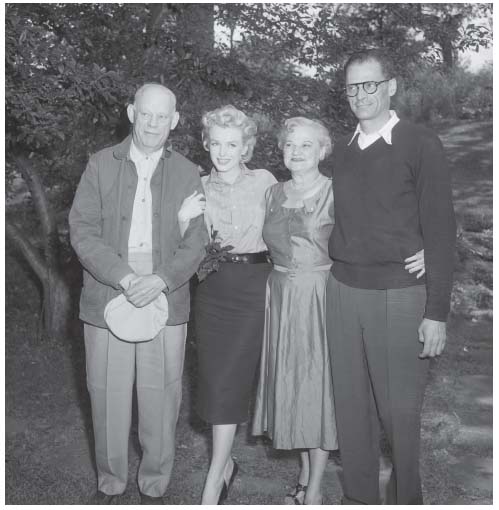
17. Miller and
Marilyn on their
wedding day,
with his parents,
June 1956
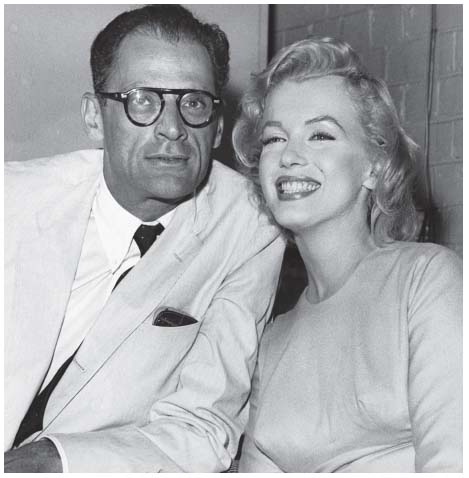
18. Miller and Marilyn,
July 1956
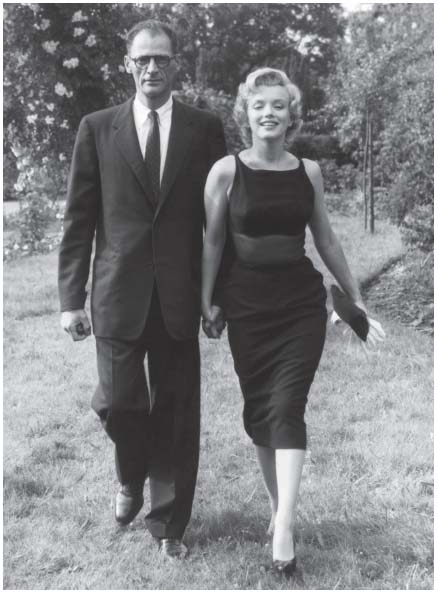
19. Miller and Marilyn in
English garden, July 1956

20. Marilyn and
Billy Wilder making
Some Like It Hot
, 1958

21. Marilyn with
Isak Dinesen and
Carson McCullers,
February 1959
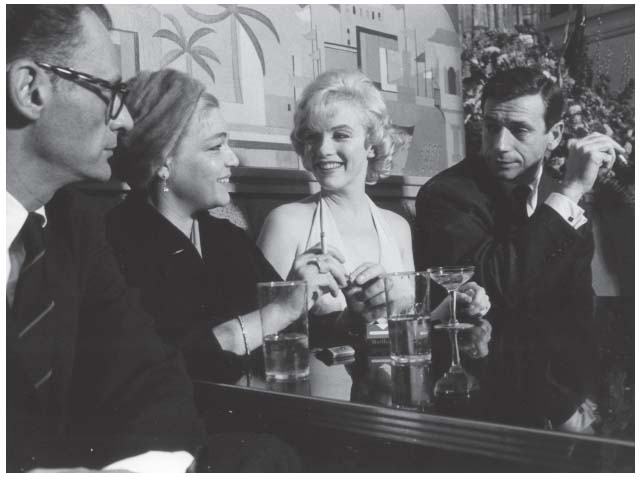
22. Miller and Marilyn with Simone Signoret and Yves Montand, January 1960
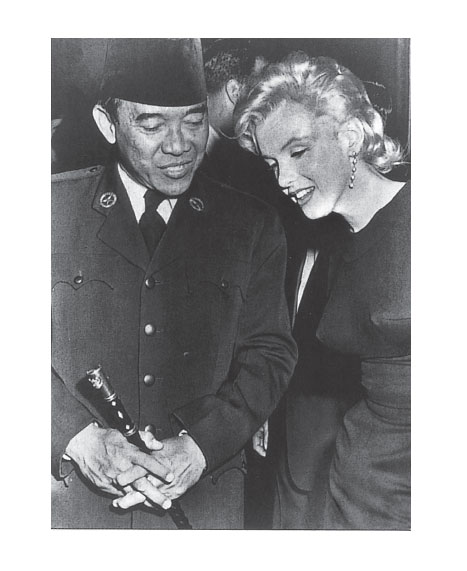
23. Marilyn with
President Sukarno, 1956
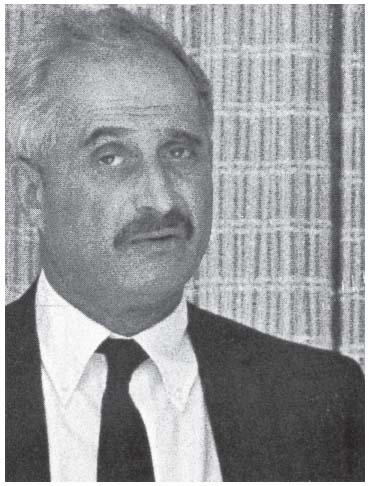
24. Dr Ralph Greenson,
c
.1960

25. John Huston, Marilyn and Miller on the set of
The Misfits
, 1960
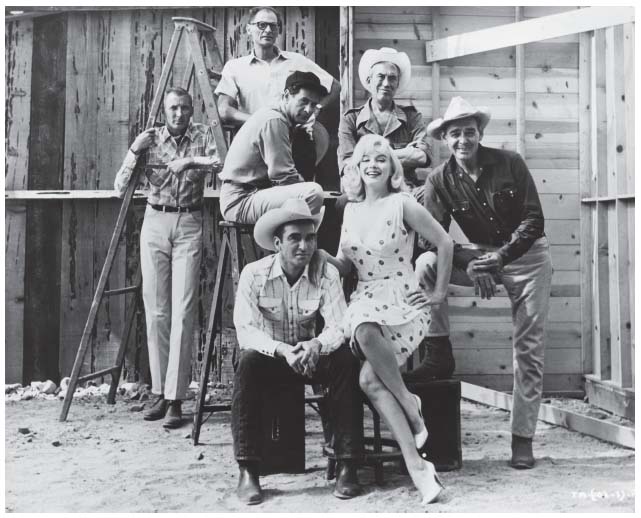
26. Frank Taylor, Miller,
Eli Wallach, Huston, Montgomery
Clift, Marilyn and Clark Gable on
the set of
The Misfits
, 1960

27. Gable and Marilyn
in
The Misfits
, 1960
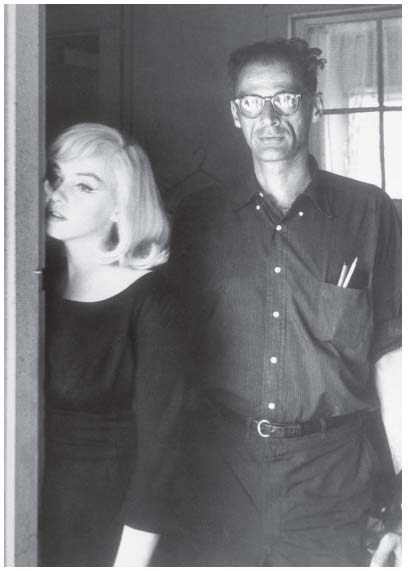
28. Miller
and Marilyn
estranged in
Reno hotel
room, 1960
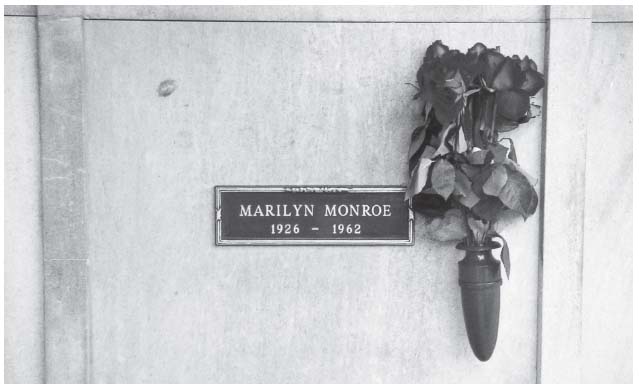
29. Marilyn's crypt, Westwood Memorial Park, 1962

